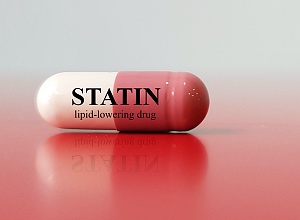People who took statins to lower cholesterol were approximately 50% less likely to die if hospitalised for COVID-19, a study by physicians at Columbia University Vagelos College of Physicians and Surgeons and New York-Presbyterian has found. “Our study is one of the larger studies confirming this hypothesis and the data lay the groundwork for future randomised clinical trials that are needed to confirm the benefit of statins in COVID-19,” says Dr Aakriti Gupta, a cardiologist at New York-Presbyterian/Columbia University Irving Medical Centre and one of the co-lead authors of the study.
“If their beneficial effect bears out in randomised clinical trials, statins could potentially prove to be a low-cost and effective therapeutic strategy for COVID-19,” adds co-lead author Dr Mahesh V Madhavan, also a cardiologist at New York-Presbyterian/Columbia University Irving Medical Centre.
Gupta, Madhavan, and the study’s leadership group are cardiologists who cared for hospitalised COVID-19 patients in the spring and summer of 2020 when the first wave of the pandemic swept through New York City.
“We observed that patients who got very sick and required hospitalization had high rates of hyperinflammation and clotting,” says Dr Elaine Wan, the Esther Aboodi assistant professor of medicine in cardiology and cardiac electrophysiology and a cardiac electrophysiologist at New York-Presbyterian/Columbia University Irving Medical Centre, one of the study’s senior authors.
“As cardiologists, statins naturally came to mind,” Gupta says. “In addition to their well-known cholesterol-lowering effect, statins are known for their anti-inflammatory, anticoagulant and immunomodulatory properties.”
Based on their observations, the authors looked at outcomes for 2,626 patients with COVID-19 who were admitted to a quaternary academic medical centre in Manhattan during the first 18 weeks of the pandemic. The researchers compared 648 patients who regularly used statins before developing COVID-19 to 648 patients who did not use statins. Patients in each group were matched so that there were no significant differences in demographics, comorbidities, or use of other medications at home.
Among the statin users, 96 (14.8%) died in the hospital within 30 days of admission compared with 172 (26.5%) of patients who did not use statins.
When other differences among the patients were factored in, the researchers found that statin use was significantly associated with a 50% reduction in in-hospital mortality (within 30 days). Patients on statins also tended to have lower levels of C-reactive protein, a marker of inflammation.
Statin use was not associated with a statistically significant decrease in the use of invasive mechanical ventilation (18.6% in statin users vs 21.9%), days on a ventilator (13.5 vs 12.8), or length of hospital stay (7 vs 7).
Other studies and meta-analyses from China have also suggested a survival benefit from statins among COVID-19 patients. However, these results may not apply to patients in Western countries who generally have more cardiovascular disease.
The current study is one of the larger studies confirming the association. Smaller retrospective studies out of North America and Europe have found similar results.
Although the study compared closely matched participants and adjusted for other variables, as a retrospective analysis, unknown factors could explain the results.
“Only randomised controlled clinical trials can evaluate the benefits of statins in COVID-19 patients,” says senior author Dr Sahil A Parikh, associate professor of medicine and a cardiologist at New York-Presbyterian/Columbia University Irving Medical Centre.
Several randomised trials are underway, including studies to determine if statins can prevent hospitalisation in outpatients, and lower the risk of death when given to hospitalised patients.
One of the study’s authors, Dr Behnood Bikdeli, a former cardiology fellow at Columbia now a fellow in vascular medicine at Brigham and Women’s Hospital, is leading a randomised clinical trial looking at the impact of statins in hospitalised ICU patients in Iran.
Study details
Association between antecedent statin use and decreased mortality in hospitalized patients with COVID-19
Aakriti Gupta, Mahesh V.Madhavan, Timothy J Poterucha, Ersilia M DeFilippis, Jessica A Hennessey, Bjorn Redfors, Christina Eckhardt, Behnood Bikdeli, Jonathan Platt, Ani Nalbandian, Pierre Elias, Matthew J. Cummings, Shayan N Nouri, Matthew Lawlor, Lauren S Ranard, Jianhua Li, Claudia Boyle, Raymond Givens, Daniel Brodie, Harlan M Krumholz, Gregg W Stone, Sanjum S Sethi, Daniel Burkhoff, Nir Uriel, Allan Schwartz, Martin B Leon, Ajay J Kirtane, Elaine Y Wan, Sahil A Parik
Published in Nature Communications on 26 February 2021
Abstract
The coronavirus disease 2019 (COVID-19) can result in a hyperinflammatory state, leading to acute respiratory distress syndrome (ARDS), myocardial injury, and thrombotic complications, among other sequelae. Statins, which are known to have anti-inflammatory and antithrombotic properties, have been studied in the setting of other viral infections, but their benefit has not been assessed in COVID-19. This is a retrospective analysis of patients admitted with COVID-19 from February 1st through May 12th, 2020 with study period ending on June 11th, 2020. Antecedent statin use was assessed using medication information available in the electronic medical record. We constructed a multivariable logistic regression model to predict the propensity of receiving statins, adjusting for baseline sociodemographic and clinical characteristics, and outpatient medications. The primary endpoint includes in-hospital mortality within 30 days. A total of 2626 patients were admitted during the study period, of whom 951 (36.2%) were antecedent statin users. Among 1296 patients (648 statin users, 648 non-statin users) identified with 1:1 propensity-score matching, statin use is significantly associated with lower odds of the primary endpoint in the propensity-matched cohort (OR 0.47, 95% CI 0.36–0.62, p < 0.001). We conclude that antecedent statin use in patients hospitalized with COVID-19 is associated with lower inpatient mortality.
[link url="https://www.cuimc.columbia.edu/news/statin-use-associated-increased-survival-severe-covid-19"]Columbia University material[/link]
[link url="https://www.nature.com/articles/s41467-021-21553-1"]Nature Communications study (Open access)[/link]

